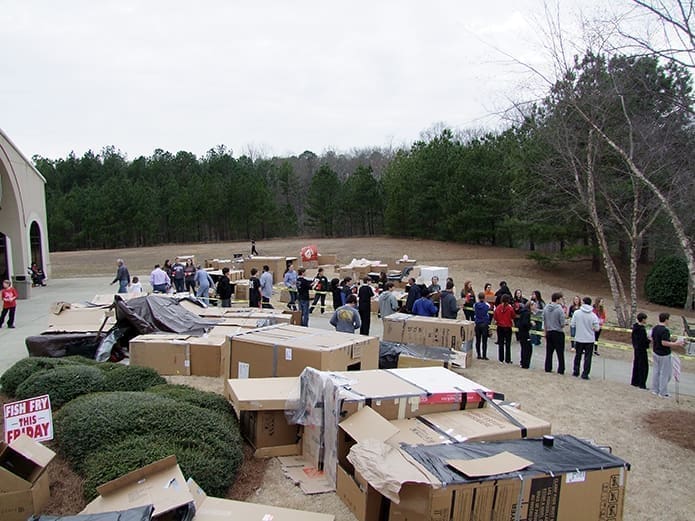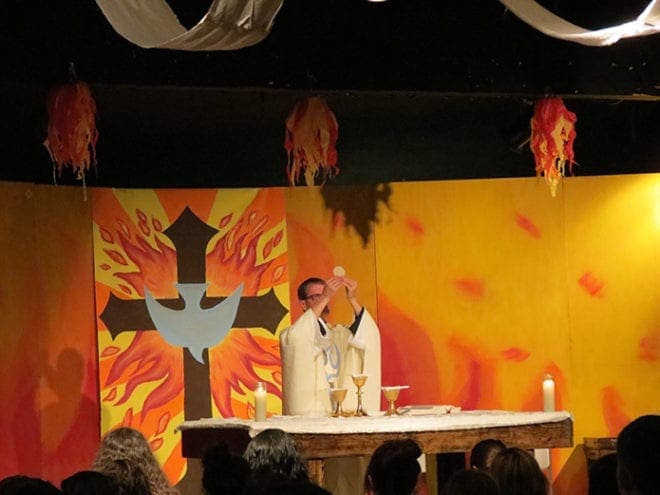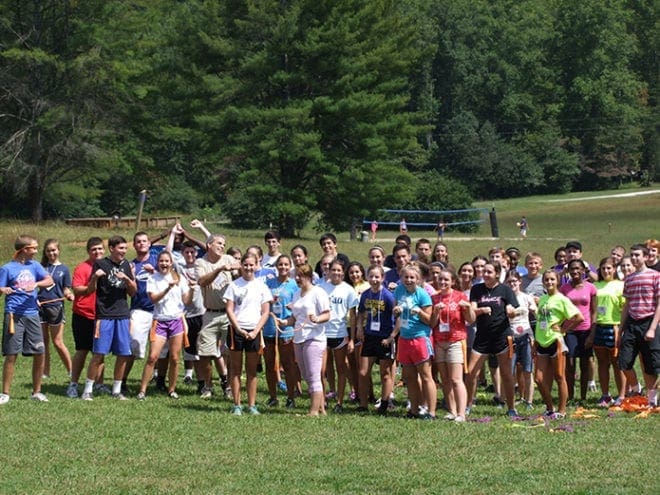 Photo by David F. McLaughlin
Photo by David F. McLaughlinDuluth
Pastor, parents, staff give St. Monica teens a message of God’s love
By SUZANNE HAUGH, Special to the Bulletin | Published February 20, 2014
DULUTH—Retreats, mission trips, adoration of the Blessed Sacrament, Bible studies, and catechesis with the pastor—these components contribute to making St. Monica’s youth ministry program vibrant and attractive to both youth and the parish at large.
Its strength was evident at an archdiocesan-wide XLT youth gathering last November, when the Duluth parish brought 100 teens and chaperones to the night of praise.
“As a parent, it is an amazing thing to have your teens excited about their faith,” wrote David McLaughlin, a parent volunteer, in an email. “It makes the teenage years so much easier.”
He should know, having raised three teens with his wife, Julie: Mary Clare, now 22, Michael, 20, and Molly, 18.
He attributed the success of the St. Monica youth ministry to one simple yet meaningful word: love.
“We love the teens to Christ. Even when a teen may not love us, or love Christ, or even love themselves, God still loves them, and there is nothing they can do about that. It is so important for them to hear that over and over by our words and our actions,” McLaughlin wrote.
The teens have plenty of opportunities to experience words put into action through the ministry’s many programs like “Youth Group Live,” a humorous look at living out one’s faith at school, which is put on by a skit group. McLaughlin said recently they played off the viral video “What does the fox say?” changing it to “What does the Church say?”
He advises parents to get their kids involved in their parish’s youth ministry program before freshman year in high school.
“Too many parents let their teens blow off church and youth group until they have to go for confirmation. By then they are so busy in their lives with sports and activities that when they do get interested in their faith, they are often too busy to continue with it,” he said.
Teens have participated in mission trips and constructed and slept overnight in cardboard villages. High school youth ministry director Melissa Ginther, who is “an incredible blessing to our parish,” McLaughlin said, orchestrates these program offerings.
Ginther’s passion for youth ministry began when she was a teen growing up and attending her church’s youth group in Alabama, volunteering while in college, working at Life Teen’s Covecrest camp and eventually landing the job at St. Monica’s in 2012.
“I got to inherit something great that has been supported by the parish and have been able to grow the program,” Ginther said in an interview.
“It takes the whole community—parents of teens, young adults help, too. There are a number under age 30,” she said.
The key to the ministry’s strength is both the parish’s involvement and its consistency.
As a team, what propels them is “a desire to bring young people to encounter Christ.”
Efforts must be made to counter what can be the culture’s pull away from knowing Christ.
“In high school, most (teens) drag their feet wondering why they need to go to church. … (We try to facilitate an) experience with Christ not as someone to be knowledgeable about but someone to be in relationship with,” she said.

St. Monica pastor Father Jack Durkin celebrates Mass for the parish’s youth group. He participates in many of the group’s activities, including retreats and mission trips. Photo by David F. McLaughlin
Mission trips are ‘opportunities to develop courage’
Ginther is not alone in this mission.
“It’s not just me, but the pastor. … He comes to the youth and brings the sacraments to them.”
Pastor Father Jack Durkin sets out in ministry to grow that relationship through catechetical sessions with youth, by offering Mass and Eucharistic adoration and also by going on mission trips with them each summer to Nicaragua through Mustard Seed Ministries. Haiti is also a destination.
“Mission trips engage them through a sense of adventure and engages them by visibly seeing the true call of Christ to serve the poor,” he said.
Calling the trips “well-crafted opportunities to develop courage,” he explained their “apostolic” nature and the experience of the universal church through shared liturgies with those they are serving. Participants also come to realize more deeply a dependence on the sacraments.
“We work together, eat together and experience an example of Christian living like the early church,” Father Durkin said.
Teens and chaperones also “pray with a greater intensity” as they stand face to face with the suffering Christ seen in the poor.
“It’s so un-abstract, real and leads to greater contemplation and reflection, and they’re given time to think about where Christ is calling them to go,” he said.
He personally looks forward to the mission trips and returns not exhausted, but refreshed.
These mission trips are “challenging, but do-able,” an approach that he also employs when approaching what can sometimes be complex catechesis with youth when back home.
“We meet them where they are but take them beyond where they are,” the pastor said.
Coupled with studying church teachings is bringing kids to adore Jesus in the Blessed Sacrament where they can meditate on theology but also come to experience Christ personally. Small dialogue groups following catechetical sessions and keeping a prayer journal are encouraged as youth develop a deeper understanding of their faith.
“They want to know the truth, to seek the truth as they try to find answers to philosophical and theological questions,” Father Durkin said.
Nicholas Molinet, who moved to the area from Venezuela with his family, can attest to this. He was a junior in high school thirsting for direction and a place to fit in when a friend invited him to attend St. Monica’s youth group. Besides the education and fellowship he experienced at weekly pizza and prayer nights, he appreciated Father Durkin’s “frequent involvement and support.”
“It was really helpful as well because it offered a lot of guidance as well as the spiritual leadership that I was searching for,” he wrote in an email.
Now a young adult, Molinet volunteers with the program, which continues to strengthen his faith.
“I didn’t know much about the faith or even what my relationship with God was like. But since my involvement, my faith has been the strongest it’s ever been and has inspired me to go on several mission trips and strongly discern the priesthood and religious life,” he said.
Receiving resources and direction on different forms of prayer has aided Molinet, who says the ministry is more than just a place to go but like a family.
“I received my first Bible and catechism at that youth group, as well as rosaries, a scapular and (information about) many different Marian devotions. There was always prayer and resources for prayer included in our Life Nights. Adoration and the sacrament of confession were and still are very present in the youth group,” Molinet said.

A recent retreat reveals the enthusiasm of the active and popular youth ministry program at Duluth’s St. Monica Church. The youth director is Melissa Ginther, who took over the program in 2012. Photo by David F. McLaughlin
‘See the world through their eyes’
There is no particular youth Mass at St. Monica’s, but families are encouraged to attend Mass together.
St. Monica’s youth minister to middle-schoolers, Ashley Thomas, said, “The family is the most important structure that we have and the most influential in a teen’s life.”
“I see such a benefit in the teens that come from a wonderful family that is faithful to the church’s teachings and those who enter the high school youth group after going through middle school youth group. Both are important and make a huge impact in a teen’s life,” Thomas said.
She has been moved by the middle-schoolers’ willingness to serve in different situations, such as sending their money to Haiti, looking out for younger siblings or helping with Mass.
She “loves” working with middle school youth. Besides their “authenticity” and “grasp of their faith” that will aid them in deciphering the truth throughout their lives, they make her laugh.
“The biggest way to connect with them is to try and see the world through their eyes,” she said.
“When you take on the viewpoint of a middle school youth then every conversation, every joke, every event can become not only a time of ministry but a time of forming relationships with the youth that encourage one another in the faith which is the ultimate goal of ministry,” Thomas said.
“It helps to know something about One Direction,” she added, (for the uninitiated, the mega-popular boy band).
The pastor said that youth are generally receptive to formation because of where they are developmentally.
“It’s easy to encourage participation (in this age group) because of their desire to be together,” Father Durkin explained. “It also makes it an easier area of work because of their natural enthusiasm and desire to enter into dialogue.”
Father Durkin and parish leaders can look at some indicators to gauge the impact of their outreach efforts.
“Something we do is look at the number of children making their first Communion and the number of teens who are receiving confirmation. … We also look at what types of decisions they’re making for college or whether they are considering service or a vocation, where they’re being educated, and are they affiliating with a Newman Center at their college,” he said.
The other impact youth ministry has on a parish is to pull back into the fold parents who may have taken a hiatus from parish life.
“The child brings them back to the faith,” Father Durkin said.